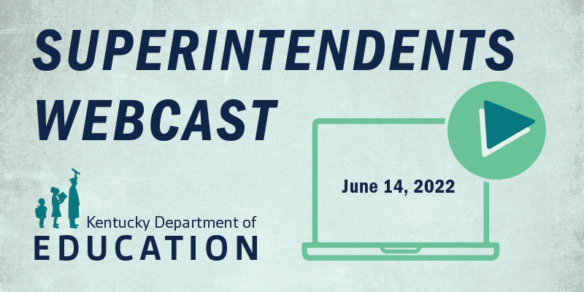
Joined by Kentucky’s Commissioner of Education Jason E. Glass, Buddy Berry, superintendent of Eminence Independent, shared the decisions behind why his district has prioritized deeper learning during the Kentucky Department of Education’s (KDE’s) June Superintendents Webcast.
The conversation builds on the department’s vision for education called United We Learn, which is designed to ensure all students receive the support and educational experiences needed to reach their full potential as students and human beings.
“What started our journey was a sense of desperation and passion,” explained Berry. “We were desperate to find an identity. We were desperate for something different.”
Dealing with declining enrollment and test scores, as well as finding it difficult to retain staff, Berry said the passion within the district allowed them to “jump into deep water.”
“The biggest thing for us was we wanted our diploma to mean something,” he said.
Taking over as the district’s superintendent in 2010, Berry immediately began planning the School on Fire motto for the district, which would launch in 2012 and still is used today.
“It was the framework for innovation for reinventing education,” he said. “We thought we needed something bigger than a program. We needed … something for our town to rally around. The goal was (to provide) a completely personalized, technology-rich, authentic, passion-based learning environment where kids couldn’t wait to be at school every day.”
For Eminence, the Eminence Exemplars, or a set of standards built into each grade level, have been successful at bringing transformative learning experiences to students.
“To be honest, that’s the secret sauce. We have created core content standards for communication, for philanthropy and for perseverance,” Berry said, adding that combining both innovation and best practice, rather than choosing one or the other, has been beneficial for the district.
The biggest piece of advice Berry had for his fellow colleagues who may be in the initial planning phases of how to develop deeper learning experiences, is to collaborate with local communities to ensure that they are receiving support.
“That is the thing that can drive the work,” he said, “because it can build the community buy-in. If you do the process correctly and get all the local business advocates, parent organizations and teachers, it can help be the momentum you need to really give you the vehicle to get to where you want to go.”
Federal funding opportunities
Robin Kinney, associate commissioner in KDE’s Office of Finance and Operations, also joined Tuesday’s webcast to talk with superintendents about federal funding opportunities for local school districts.
The Infrastructure Investment and Jobs Act (IIJA), also known as the Bipartisan Infrastructure Law, provides $1.2 trillion for several infrastructure-related projects, including the Environmental Protection Agency’s (EPA) Clean School Bus Program.
The IIJA authorizes the EPA to offer rebates to replace existing school buses with clean and zero-emission models. For the 2022 rebates, the EPA anticipates offering $250 million for clean school buses and $250 million for zero-emission school buses nationwide.
Districts looking to replace 2010 or older diesel school buses can contact Elisa Hanley, pupil transportation branch manager in KDE’s Division of District Support, for more information.
Additionally, $500 million will be made available by the U.S. Department of Energy for competitive grants to make energy efficiency, renewable energy, and alternative-fueled vehicle upgrades and improvements at public school facilities nationwide.
Eligible uses will include energy efficiency, ventilation, renewable energy, alternative vehicles and alternative fuel vehicle infrastructure improvements.
More information on this opportunity is expected to be available when an announcement is released in late summer or early fall, Kinney said.
And, finally, funds from the U.S. Department of Transportation will be made available each fiscal year for community grants to install electric vehicle charging and alternative fuel in locations on public roads, schools, parks and in publicly accessible parking facilities.
These grants will be prioritized for rural areas, low- and moderate-income neighborhoods, and communities with low ratios of private parking or high ratios of multiunit dwellings.
“Districts are encouraged to read up on and stay abreast of the various opportunities for federal grants,” Kinney said. “These federal grant opportunities require districts to directly apply to the awarding federal agency.”
As additional information becomes available, KDE will provide updates to districts, Kinney added.
In other business, superintendents:
- Received a recap of Glass’ presentation to the Interim Joint Committee on Education, in which he discussed how to increase and maintain the state’s teacher workforce;
- Heard communications updates from KDE’s Chief Communications Officer Toni Konz Tatman. Updates included information on the ongoing Summer Boost reading series. Glass will be participating in the program on Wednesday, June 15, for two sessions in Bullitt County. Summer Boost is a partnership between KDE, the Summer Food Service Program and the Children’s Reading Foundation. The program promotes family engagement in reading and math by giving away free books and fun items. All Kentucky families can visit the Summer Support webpages for more information;
- Received Kentucky Board of Education (KBE) updates from Chair Lu S. Young. The board held its June regular meeting at the Sower Building in Frankfort on June 8. During that meeting, the board released Menifee County Schools from state assistance after eight years. KDE conducted a new management audit of the district in February and determined state assistance was no longer necessary. A recap of the June 8 KBE meeting is available on Kentucky Teacher; and
- Discussed ongoing American Rescue Plan Elementary and Secondary School Emergency Relief (APR ESSER) requirements with KDE Associate Commissioner Kelly Foster.



Leave A Comment